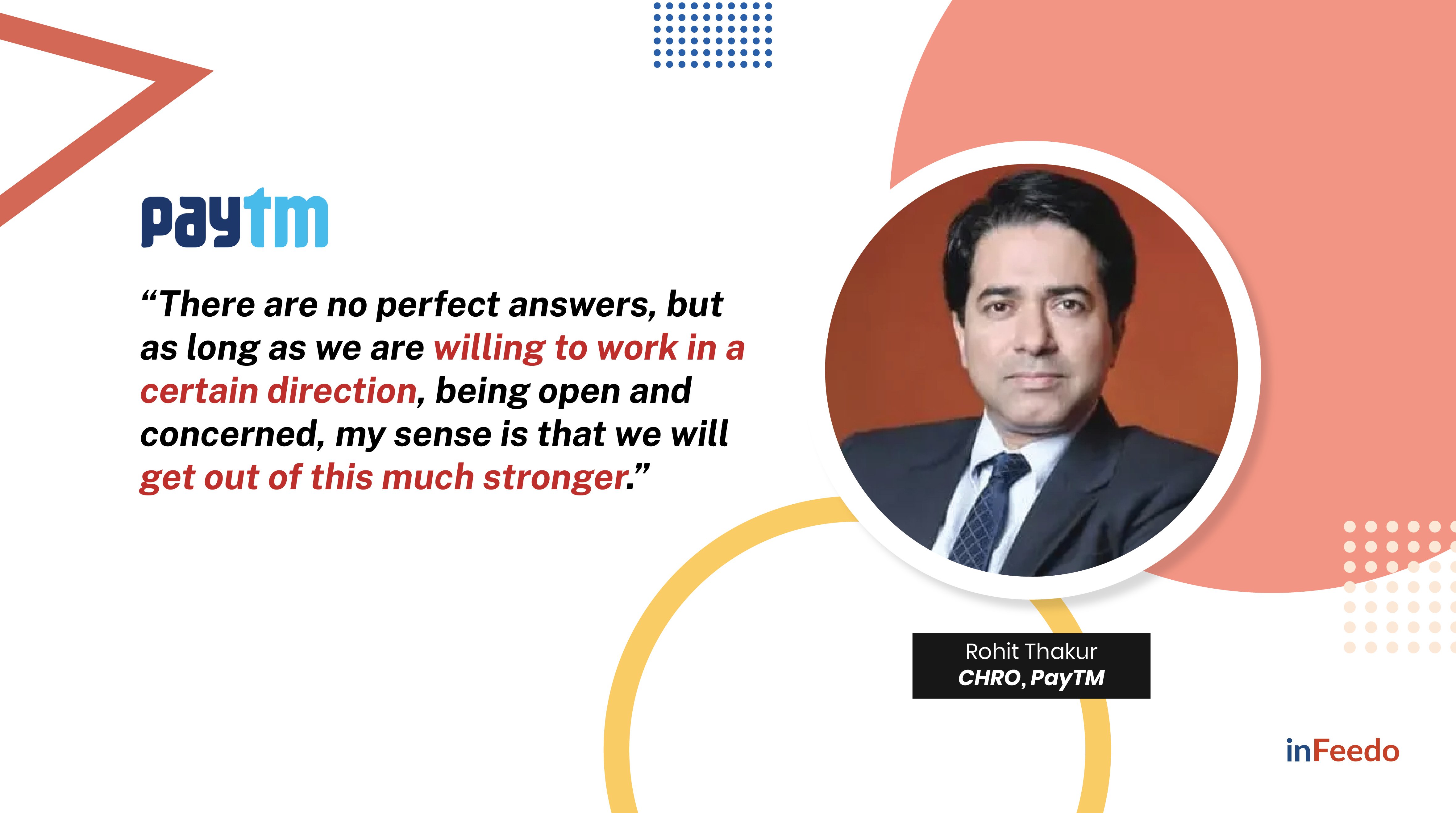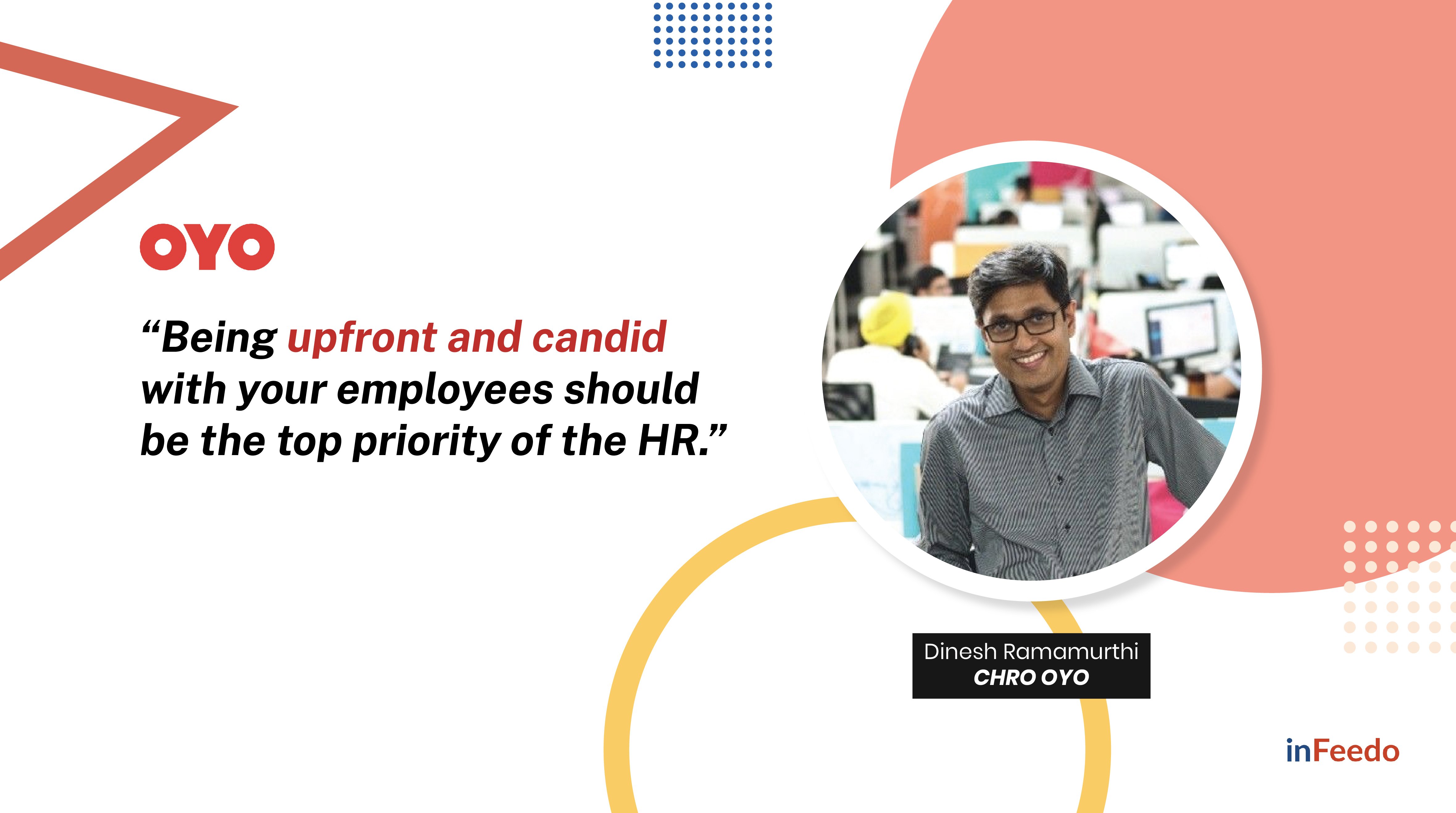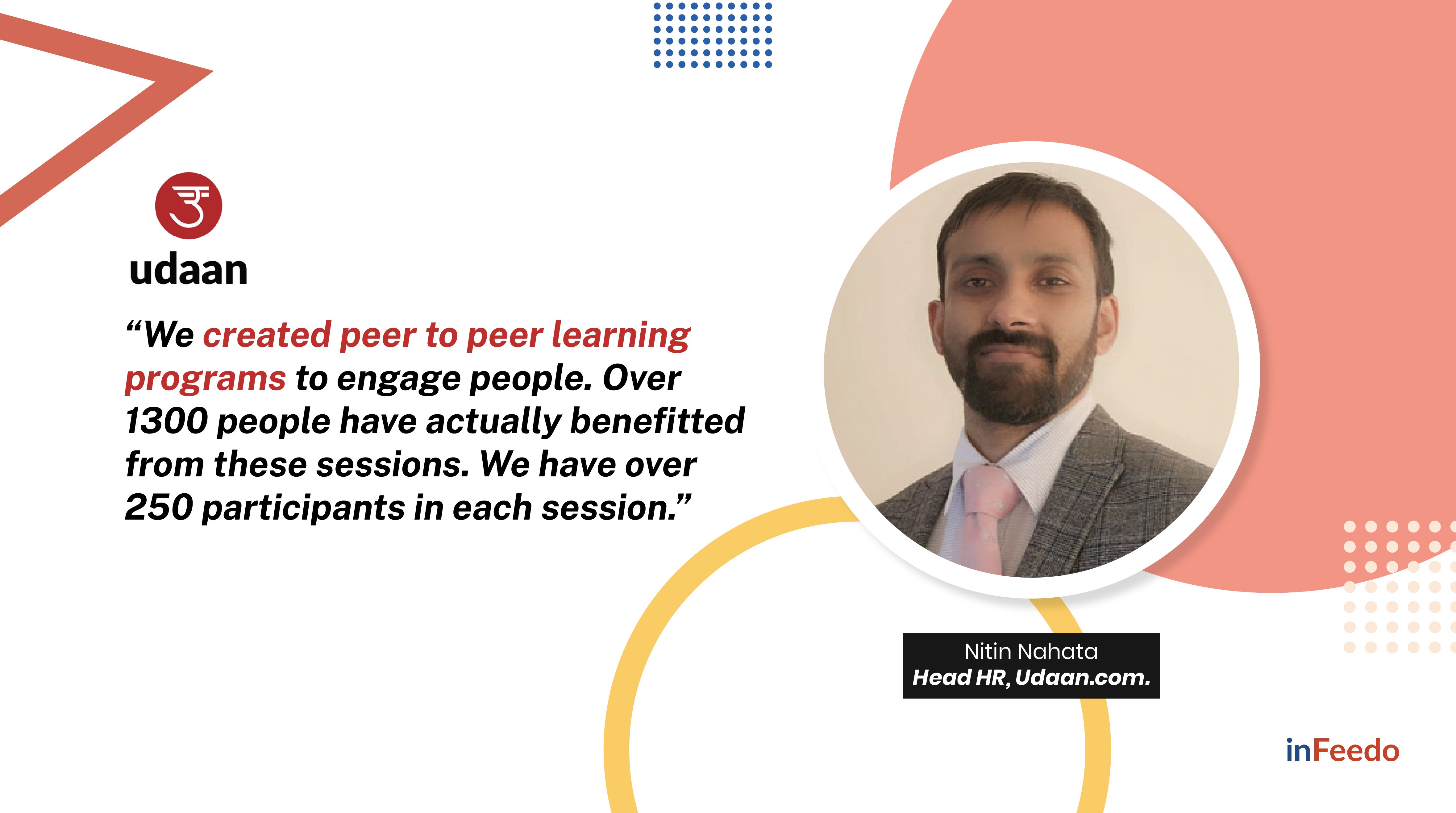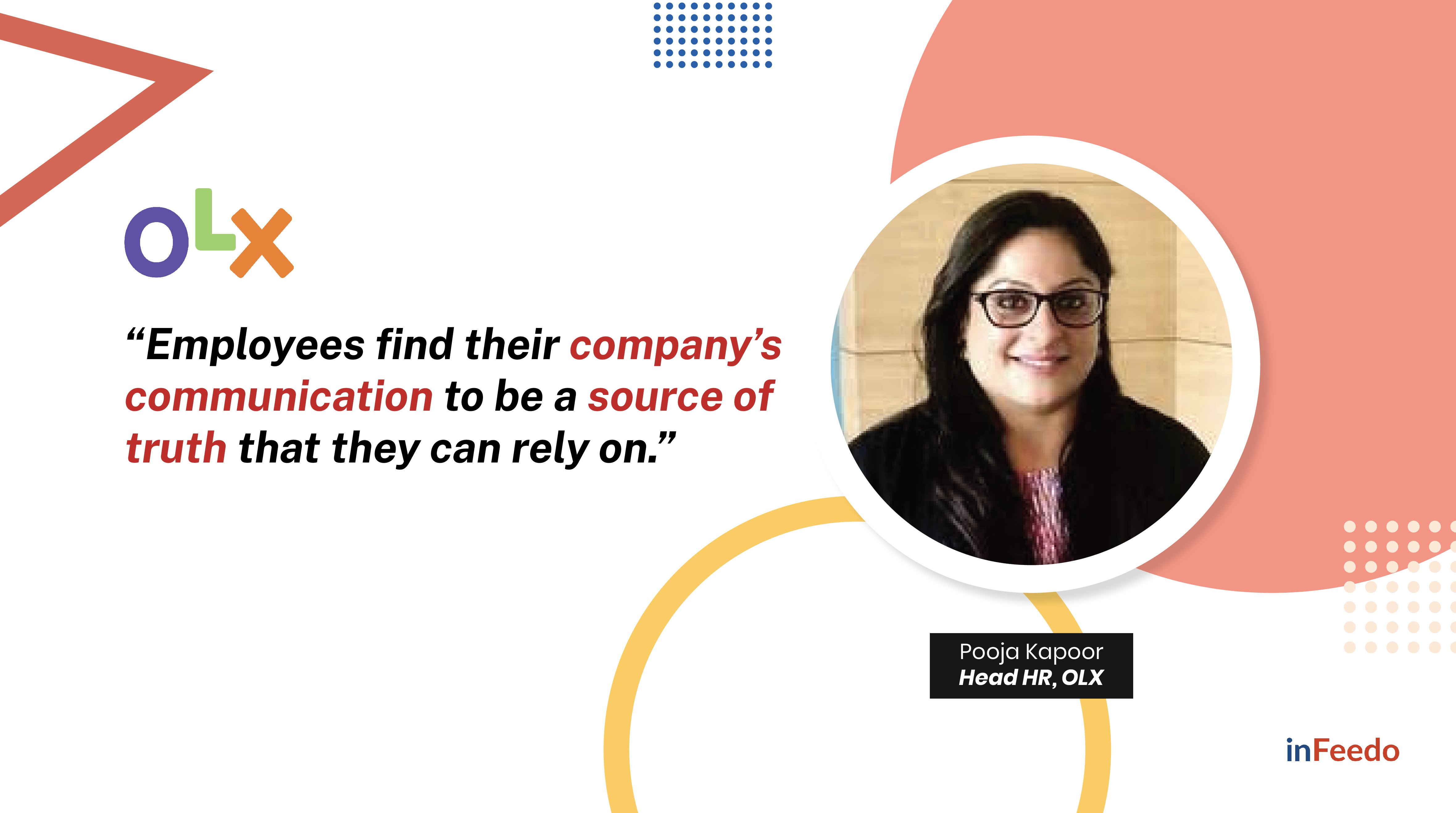4 min read
Akanksha Tanwar
Last Updated: 6 February 2023
Recently, the team at inFeedo organized a power panel with Dinesh Ramamurthi, CHRO at OYO, Rohit Thakur, CHRO at Paytm, Pooja Kapoor, Head HR at OLX, and Nitin Nahata, Head HR at Udaan.com, where they discussed building and maintaining employee first policies in startup unicorns during the time of COVID-19.
COVID-19 is an unprecedented crisis and has made work from home, which was often a monthly or bimonthly “privilege,” earlier, the new normal. From resizing to process workarounds, HR professionals have been leading and defending the corporate frontline in this war that none of us saw coming! Read on to find out how these startup unicorns in the spotlight are tackling the crisis to sustain and survive in current times.
Watch The Full Power Panel Session Here

One obvious example here is sales planning, which has changed drastically since the last quarter for almost all organizations. It needs to be re-imagined from scratch. Similarly, costs and revenues need to be understood in a fresh light with a robust focus on people management. “The emphasis on our people - increasingly, and rightly so, has been one area of concern for us. We have a very good HR Team but how to work remotely was a priority. Incorporating elements of employee well-being while dealing with the uncertainty was also an area of focus of us,” said Rohit Thakur, CHRO at Paytm

Nobody can today tell with clarity what the course of action going ahead is going to be like. “Thus, being upfront and candid with your employees should be the top priority of the HR,” adds Dinesh Rammaurthi, CHRO at OYO.
This should be the starting point of all kinds of prioritization. Engaging much more at a personal level and trying to drive initiatives is needed. There is an inherent value conflict that needs to be addressed between employees and management. “Employees find their company’s communication to be a source of truth that they can rely on,” said Pooja. The focus needs to be placed on leadership communication. Townhalls and one-on-ones have been revolutionary in bridging this gap and bringing enhanced efficiency.
In absence of distractions like a daily commute, our system has become more efficient in terms of output. Therefore, the efficiency of functions like sales has gone up at a lot of organizations. “In fact, our sales team is able to take up as many as 8 meetings per day. And not because they have to rather because they don’t have distractions like travel in their day anymore,” Dinesh added. What seemed impossible 3 months ago has proved to be a more efficient way to get the job done.
Almost 6 months into the crisis we can say for sure that it is here to stay. If people are going to be working from home, evaluation tools like productivity matrices need to evolve accordingly. Forecasts, productivity, and innovation take the centre stage in this evolution. It is, therefore, important to invest in technology to enable a digital transformation of culture. “There is nothing called work from home policy anymore”, Dinesh said. With everyone working from home for so long now, there has been a radical shift in the thought process. The responsibilities of the manager and the entire employee-manager dynamics in terms of load sharing have been redefined due to the whole situation and its persistent nature.
“At OLX, we have been very privileged to be a startup-like ecosystem with processes and maturity that comes with being a 100-year-old organization,” Pooja mentioned. Performance cycles, different kinds of calibrations are being now closed on video across organizations. Reading and knowing more about how things can be done better is key for HR now. Understanding that technology will probably drive a lot of outcomes, but at the same time, the human touch needs to be kept alive. This is a continuous learning process that HR needs to embrace. “There are no perfect answers, but as long as we are willing to work in a certain direction, being open and concerned, my sense is that we will get out of this much stronger,” added Rohit.

While it is important to assimilate new joinees into your culture, it’s equally important to focus on finding new ways to make them productive and get them up to speed in the organization. We must leverage technology and look for alternatives to ensure that the learning opportunities that we get from an in-office setting do not stop in the new normal. “We created peer to peer learning programs to engage people. Over 1300 people have actually benefited from these sessions. We have over 250 participants in each session,” Nitin Nahata, Head HR at Udaan.com shared.
With kids, spouses, and parents becoming a part of the workplace due to these circumstances involving them in key processes is a step in the right direction. “We did something within the HR team and involved the family as well through one-hour interactive sessions,” Nitin shared with us. Because of initiatives like this, the kids and parents also get to understand what their parent or partner does in front of the screen all day. It helps the employee deal with the added and unsaid pressures of working from home more efficiently. At the same time, it contributes to bettering the mental health of the employee.
Leadership must take initiatives to keep organizational culture strong and employee first. HR needs to actively involve the leaders of the organization to ensure that the expertise and assurance that the leadership can bring to the table get propagated throughout the organization. At the employee level, even the smallest actions from the leadership can have a cascading effect and give them the motivation to sail through such times smoothly.

Uncertainty, the threat of physical incapacitation by the disease, the possibility of financial setback and job loss, and more have made employees more vulnerable than ever. While the topic has been a matter of discussion for a while, now is the time to reconsider the impact of initiatives taken or take the first step in this direction. “Mental health has been a part of our insurance policy, we also have an app for the same. The app talks to the employee, to understand how the employee feels that day and suggests measures accordingly,” added Rohit. Thus interactive and smart technology has an important role to play moving forward and should be leveraged to its utmost potential by both new-age organizations as well as well-established ones.
Watch for more insights here.